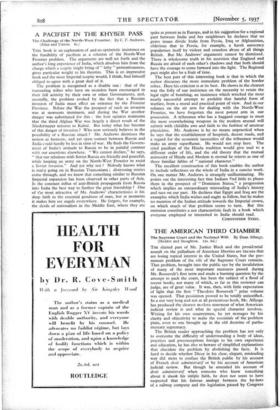A PACIFIST IN THE KHYBER PASS
The Challenge of the North-West Frontier. By C. F. Andrews. (Allen and Unwin. 6s.)
THIS book is an exploration of and an optimistic insistence on the feasibility of pacifism as a solution of the North-West Frontier problem. The arguments are well set forth and the author's long experience of India, which absolves him from the charge which a sceptic might bring of " lefty " pretentiousness, gives particular weight to his theories. ' This is an impressive book and the most Imperial sceptic would, I think, find himself obliged to agree with a great deal of it.
The problem is recognised as a double one : that of the marauding tribes who have on occasion been encouraged in their fell activity by their own or other Governments, and, secondly, the problem evoked by the fact that a Russian invasion of India must effect an entrance by the Frontier Province. Before the War the prospect of such an invasion was at moments imminent, and during the War another danger was substituted for this : the best opinion maintains that the third Afghan War was largely a direct result of the Niedermayer mission to Kabul. But today what has become of this danger of invasion ? Who now seriously believes in the possibility of a Russian attack ? Mr. Andrews dismisses the notion as fantastic, and yet open contact between Russia and India cDuld hardly be less in time of war. He finds the Govern- ment of India's attitude to Russia to be in painful contrast with our assertions elsewhere. "We cannot declare," he says, " that our relations with Soviet Russia are friendly and peaceful, while keeping an army on the North-West Frontier to resist a Soviet invasion." And yet why not ? Nobody knows what is realty going on in Russian Transoxiana ; distressing stories come through, and we know that something similar to Russian Imperial expansion has been observed in other parts of Asia. Is the constant influx of anti-British propaganda from Russia into India the best way to further the great friendship ? One of the most attractive of Mr. Andrews' characteristics is his deep faith in the essential goodness of man, but at moments it makes him see angels everywhere. He forgets, for example, the devils of nationalism in the Middle East, where they are • quite as potent-as in Europe, and in his suggestion for a regional
Pact between India and, her neighbours he declares that no zrave issues divide India from Persia, Iraq or Afghanistan,
oblivious that in Persia, for example, a harsh autocracy popularises itself by violent and ceaseless abuse of all things British. But Mr. Andrews' arguments cannot be dismissed. There is wholesome truth in his assertion that England and Russia are afraid of each other's shadows and that both should have the courage to come forward into the light. The Regional pact might also be a fruit of time.
The best part of this interesting book is that in which the author discusses the more immediate problem of the border tribes. Here his criticism is at its best. He shows in the clearest way the folly of our insistence on the necessity to retain the legal right of bombing, an insistence which wrecked the most nearly successful attempt to prohibit that hateful form of warfare, from a moral and practical point of view. And in our reliance on the air arm for dealing with the North-West Frontier, we have forgotten the most potent arm in our possession. A tribesman who has a haggard courage to meet the most overwhelming weapons in the modern arsenal will submit with childlike awe and faith to the feeblest of amateur physicians. Mr. Andrews is by no means impractical when he says that the establishment of hospitals, decent roads, and a regard for the economic necessities of the tribesmen would make an army superfluous. He would not stop here. The tried pacifism of the Hindu tradition would give soul to a different order of life, and the old theory that the mutual animosity of Hindu and Moslem is eternal he rejects as one of those familiar fables of " national character."
The excellent construction of this book enables the author to include reflections on the whole of India in a concise work. On one matter Mr. Andrews is strangely unilluminating. He points out the interesting fact that Indians find little to please them in the prospect of " Dominion Status," a progression which implies an extraordinary misreading of India's history and race on our part. He declares that Egypt and Iraq are the examples which India wishes and ought to follow, but he makes no mention of the Indian attitude towards the Imperial crown, on which much of that problem seems to turn. But this omission constitutes a not characteristic fault in a book which everyone employed or interested in India should read.
CHIUSTOPHER SYKES.














































 Previous page
Previous page